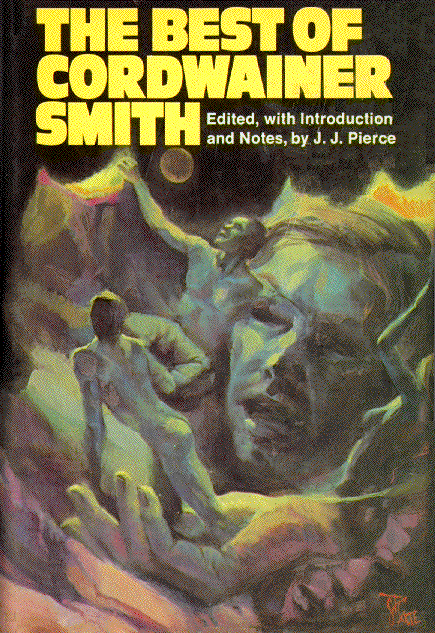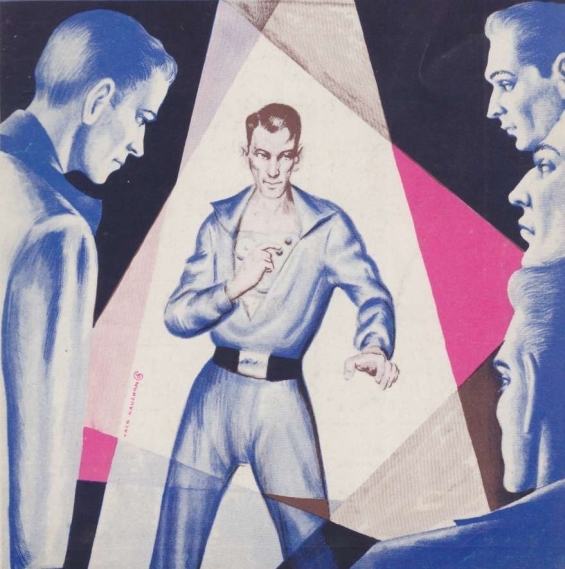When I came cross an old hardcover copy of the Best of Cordwainer Smith at a nearby 2nd Ave. Value Store, I had never heard of any such author. Over the past couple of years, though, my adventures with Appendix N and similar canonical texts have taught me that this means little. It had an interesting cover, and “Cordwainer” struck me as a rather cool, if unusual name. A quick scan of the inside dust jacket sold me, for it was a book of pulp scientifiction stories from the 50’s and 60’s!

I’ve really come to appreciate short stories. When you’ve got a long list of authors to sample, there’s nothing better. In recent weeks I’ve had the good fortune to read and share some thoughts on the likes of Andre Norton and Leigh Brackett, and now I’m pleased to add another name to that list.
The book’s introduction illuminates the life of a fascinating, though very private man. Cordwainer Smith was the pen name of Paul Myron Anthony Linebarger, born in Milwaukee in 1913. Though a U.S. citizen, he grew up mostly in China, Japan, France, and Germany. His godfather was Sun Yat-sen, the founder of the Republic of China. Linebarger was an expert on Asian, especially Chinese, affairs, served as an officer in WW2, and was a leading authority on psychological warfare. It’s no stretch to say he lead an extraordinary life, but on top of all that he was an accomplished, if under-recognized, writer of science fiction.
The great depth of his imagination and writing talent is on full display in the first entry of the collection – perhaps his most well-known story, “Scanners Live in Vain.” The tale is part of his Instrumentality of Mankind universe – a setting in humanity’s future following a nuclear holocaust on Earth.
“Scanners” introduces us to a world in which space travel between planets has been made a reality. In the creations of many other scifi creators, speed and time are often the main hurdles to such methods of transportation. In Smith’s universe, however, the first great obstacle that mankind must overcome to journey among the stars is the “pain of space.” Men who are exposed to space travel experience acute pain and nausea that eventually kills them.
In order to overcome this constraint, the haberman is developed: a machine-like man whose mind has been cut off from all sensory input (except his eyes). His emotions are dulled, and he is equipped with meters and dials that display the status of his vitals. Most habermen are scum – criminals and low-lives who have been sentenced to such a fate that they may work as crew members of spaceships upon which regular humans travel in cold sleep. The lives of most habermen are cheap, and they must be constantly monitored and their vitals adjusted lest their organs fail.
The main characters of “Scanners Live in Vain” are habermen of a different kind. Scanners are volunteers, who undergo the treatment so that they may pilot spaceships and direct the operations of the lesser habermen. They also monitor and manage vitals – their own and those of the other habermen. Scanners are honored, but tragic figures. Their lives are monotonous and lonely, though periodically they are allowed to “cranch,” a process by which their senses are restored and they may live as normal human beings for about a day or two every month.

The imagining of habermen and scanners, and talk throughout the story of “Old Machines” and “Beasts” of the wilds really impressed me. For how many scifi authors unfailingly fall back to almost-generic aliens and robots?
I don’t want to spoil the plot of “Scanners,” but I will say the protagonist and the situation he is placed in are fascinating and masterfully illustrated. Scanner Martel is unique among his kind in that he has wooed and married a normal woman. He thus experiences a sort of loneliness and frustration that his brother scanners do not. When a “top emergency” arises, it is this love of his wife and longing to ease her life and be with her as a real man that will put him at odds with his companions.
“Scanners Live in Vain” can be read at the Internet Archive.
If you haven’t read this one, check it out. You won’t regret it!
PCBushi can also be found on Twitter or at the PCBushi blog, where he ruminates on scifi/fantasy, games, and other spheres of nerd culture.

